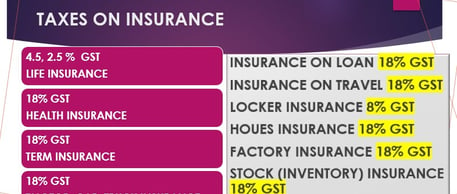Are you remitting payment for insurance or for Goods and Services Tax (GST)? Or are you procuring insurance due to life uncertainties, government lapses, privatization, escalating civil unrest, accidents, and drug-related concerns?
Mr. Ansari Analysis 29.3.24
Consider the rationale behind the government's imposition of GST or any form of tax on insurance. Are you acquiring an insurance policy because of governmental shortcomings in safeguarding citizens, maintaining infrastructure such as roads, and fostering social equilibrium? By this, I mean the perpetuation of threats by politicians and various factions, leading to feelings of insecurity for your family, relatives, and future. Consequently, you resort to purchasing insurance policies to mitigate these fears, which the government exploits by levying excessive taxes multiple times over.
You procure insurance policies due to governmental shortcomings in safeguarding citizens, ensuring infrastructure maintenance such as roads, and fostering societal equilibrium.
The existence of political factions and disruptive elements engenders threats, compelling you to seek security for your family, relatives, and future through insurance.
The government, capitalizing on this fear, imposes multiple layers of taxation.
Are you allocating funds for insurance coverage or for GST (Goods and Services Tax)? Are you investing in insurance as a safeguard against life uncertainties, government inadequacies, privatization, escalating riots, accidents, and drug-related incidents?
Are you remitting payment for insurance premiums or for Goods and Services Tax (GST)? Or are you procuring insurance coverage due to life uncertainties, governmental deficiencies, privatization, escalating incidents of riots, accidents, and drug-related matters?


The implementation of Goods and Services Tax (GST) on insurance policies has several implications for both insurers and policyholders, with both advantages and disadvantages.
For Insurers:
Good Things:
1. Simplified Tax Structure: GST replaces multiple indirect taxes with a unified tax system, streamlining tax compliance and reducing administrative burdens for insurers.
2. Input Tax Credit (ITC): Insurers can claim ITC on the GST paid on goods and services used in the course of their business operations, leading to potential cost savings.
3. Uniformity: With GST, there's a uniform tax rate across the country, promoting consistency and ease of operation for insurers with a nationwide presence.
4. Increased Compliance GST encourages formalization of the economy, reducing tax evasion and increasing compliance.
Bad Things:
1. Increased Tax Burden: Depending on the specific insurance product, the GST rate can vary, potentially leading to increased costs for insurers, which may eventually be passed on to policyholders.
2. Complexity in Transition: The transition to GST might involve initial complexities, such as updating IT systems, training staff, and adapting to new compliance requirements.
3. Impact on Premiums: Higher tax rates on certain insurance products could make them less affordable for consumers, potentially affecting demand and sales volume.
For Policyholders:
Good Things:
1. Transparency: With GST, policyholders have a clearer understanding of the tax component in their insurance premiums, enhancing transparency in pricing.
2. Input Tax Credit Benefit: Insurers passing on the benefit of ITC to policyholders may lead to lower premium costs or improved policy features.
3. Nationwide Uniformity: GST ensures a consistent tax rate across states, eliminating variations in tax rates and making insurance products more accessible and affordable across the country.
Bad Things:
1.Higher Premiums:Depending on the GST rate applicable to their insurance policy, policyholders may experience an increase in premium costs.
2. Initial Confusion:Policyholders may face confusion during the initial transition phase as insurers adjust their systems and processes to comply with GST regulations.
3. Impact on Affordability: Higher GST rates could make certain insurance products less affordable for policyholders, potentially reducing insurance penetration rates.
Overall, while GST implementation simplifies tax administration and promotes uniformity, its impact on insurers and policyholders varies depending on factors such as the type of insurance product and the specific GST rate applied.






